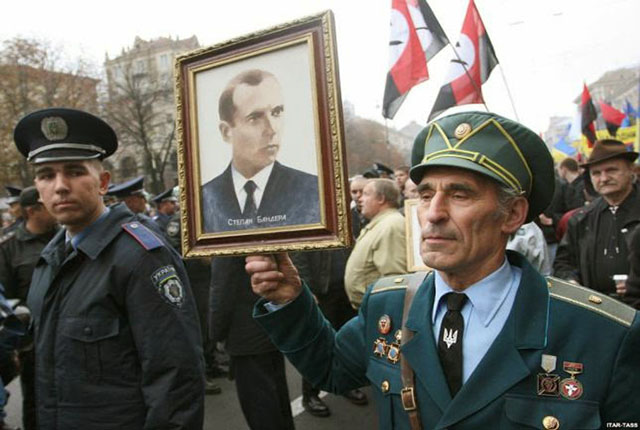
Poland declares the massacre of more than 30,000 Poles by Ukrainian nationalists during World War II “genocide” while in Kiev a new road is named after their leader, Stepan Bandera. Something goes wrong.
Let’s stick to the facts. On July 22, the Sejm, the lower house of the Polish parliament, unanimously passed a resolution to commemorate the victims of the massacres in Volyn, between 1943 and 1945. The resolution “declares July 11 Day of commemoration in memory of the Poles who fell victim to the genocide committed by OUN-UPA and pays homage to the victims of the genocide committed by Ukrainian nationalists against citizens of the Second Polish Republic in 1943-1945″.
The Sejm refers to the victims of the Ukrainian insurgent army, UPA, in the western regions of Volyn and Galicia during the World War II. The UPA was the armed wing of the Organization of Ukrainian Nationalists, the OUN founded by Stepan Bandera, in some phases of the war collaborated with the Nazis in an attempt to repel the Soviets, and always with the aim of cleaning the western territories from all non-Ukrainian ethnics. The largest community was the Polish one. The UPA “operations” – such as devastation and burning of entire villages, mass executions, torture and mutilation – caused a death toll that has not yet been established, and perhaps never will be. The most conservative esteems report at least 30,000, but some scholars raise the toll up to 100,000 deaths.
It was a war. And the Poles did not stand by and let it happen. Historians tend to attribute to the Polish retaliation least 20,000 deaths among the Ukrainians. Again, innocent civilians, women, children and elderly. And it must be said that the Seijm also mentioned the liabilities of Polish citizens. “While recalling the atrocities of Ukrainian nationalists”, the resolution reads, “one cannot turn a blind eye to reprisal actions in Ukrainian villages that too claimed the lives of civilians”.
The “bad heroes” of Ukrainian independence
The Polish Parliament move caused laments in Ukraine. President Poroshenko wrote on Facebook he’s “sorry for the decision of the Sejm.” It was not hard to imagine. Ukrainian historical vision describes the UPA partisans as heroes and draws a curtain of silence over atrocities in Volyn and Galicia. And Stepan Bandera, their leader and very controversial historical figure, is a national hero just like the poet Taras Shenvchenko. Streets and squares in many eastern cities of Ukraine are named after him and the “Heroes of UPA”, Lviv even erected a statue, and since less than a month plates with his name hung on former Moscow Avenue in Kiev. The wave of “decommunization” is going on. “Stepan Bandera Avenue is a good start, but it’s still not enough,” said Oleksandr Brygynets, member of the Rada and advisor to the Minister of Information.
Bandera has always been divisive figure in Ukraine. A hero in the West and Kiev, a Nazi criminal everywhere else east of the Dnieper.
According to the facts, Poland had not done anything but commemorate its victims. It is not even the first time. Already in 2013, commemorating the 70th anniversary of the massacre, the Sejm – that time led by liberal majority and immune from today’s nationalist tendencies – labeled the events “ethnic cleansing with elements of genocide“.
Lamenting the condemnation of crimes committed by Ukrainian nationalists seventy years ago as an indictment of today’s Ukrainian people it is as if the Germans would feel affected by any condemnation of Nazi crimes. On the other hand, not recognizing the role of UPA in the killing of tens of thousands of Jews and Poles – and react in this way to the Sejm resolution – is a behavior that closely resembles that of Turkey towards the Armenian genocide. Even more, considering that today Poland is the main sponsor of the European path of Ukraine.
Poroshenko is wrong to be sorry for Sejm’s resolution and the Ukrainian authorities are wrong when they name streets after Bandera and the UPA. Even only taking in account that they offer an easy subject to pro-Russian propaganda. And in fact Poroshenko wrote on Facebook that “Many will use the Polish decision for political reasons.” Kremlin’s trolls have actually been quick to use the “Banderovtsy” argument, but certainly initiatives such as the Stepan Bandera Avenue offer them opportunities on a plate.
It is a very sensitive topic, and whatever one says there is someone who takes it badly. But one thing can surely be said, that it is time for Ukraine to better choose its own national heroes.
@daniloeliatweet
Poland declares the massacre of more than 30,000 Poles by Ukrainian nationalists during World War II “genocide” while in Kiev a new road is named after their leader, Stepan Bandera. Something goes wrong.







